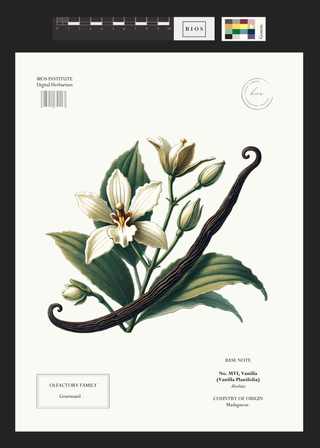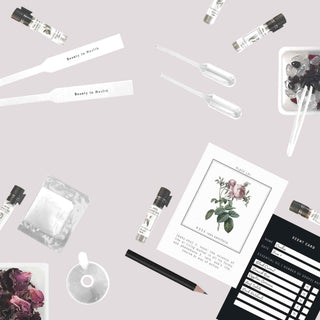

Vanilla planifolia, commonly known as vanilla, is native to Mexico. It is believed to have originated in the southeastern region of the country, particularly in the states of Veracruz and Puebla. The indigenous people of Mexico, such as the Totonac people, were the first to cultivate and use vanilla.
The vanilla vine produces long, greenish-yellow flowers that eventually develop into green pods or beans. These vanilla beans are the part of the plant used for their aromatic and flavoring properties. Vanilla has a sweet, rich, and creamy scent that is widely cherished in the culinary and fragrance industries.
Due to its popularity and unique aroma, vanilla cultivation has expanded to various tropical regions worldwide, including Madagascar, Indonesia, Tahiti, and other parts of the Indian Ocean and the Caribbean. Madagascar has become the largest producer of vanilla globally, known for its high-quality Bourbon vanilla, which comes from Vanilla planifolia. Our Vanilla is sourced from Madagascar.
Vanilla is known for its warm, sweet, and creamy scent. It has a comforting and indulgent quality that adds depth and richness to perfumes. The aroma is often described as sweet, gourmand, and slightly floral.
Vanilla is a versatile note in perfumery and can be used in various fragrance types, from oriental and gourmand fragrances to floral and woody compositions. It blends well with a wide range of other ingredients, adding a smooth and harmonizing element to perfume compositions. It is a Base note found in our Gourmand family.
Vanilla has the ability to enhance and round out other fragrance notes. It can soften sharper or more intense ingredients, adding a velvety and creamy quality to the overall fragrance.
Vanilla is often associated with sensuality, warmth, and intimacy. Its sweet and inviting aroma can evoke feelings of comfort, nostalgia, and a sense of familiarity. It is a popular choice in perfumes that aim to create a cozy and seductive ambiance.
Vanilla is a key component in gourmand fragrances, which are perfumes that feature edible and dessert-like notes. These scents often evoke the aromas of pastries, chocolates, and sweet treats. Vanilla contributes to the overall delicious and indulgent character of gourmand fragrances.
Overall, vanilla is a beloved and widely used ingredient in perfumery due to its versatile, comforting, and sensuous qualities.
Vanilla has its origins in Mesoamerica, where it was highly valued by the ancient Mayans and Aztecs. The Aztecs referred to vanilla as "tlilxochitl," meaning black flower. Vanilla was used as a flavoring agent in beverages, including the sacred drink called "xocoatl," which was consumed during rituals and ceremonies.
Vanilla gained popularity in Europe during the 17th century when it was introduced by Spanish explorers. It quickly became a sought-after ingredient in culinary preparations, especially desserts and pastries. Vanilla became associated with luxury and refinement in European cuisine and is widely used in cakes, cookies, ice creams, and custards.
In some cultures, vanilla is associated with love and romance. Its warm and sweet aroma is believed to have aphrodisiac properties, and it is often used in scents and products designed to enhance sensuality and intimacy.
In certain traditional medicinal practices, vanilla is believed to have calming and relaxing effects. It is used in aromatherapy to relieve stress, anxiety, and insomnia. The comforting scent of vanilla is thought to promote a sense of well-being and relaxation.
In indigenous cultures of Madagascar, where a significant portion of the world's vanilla is produced, vanilla holds cultural and economic importance. The Malagasy people have traditional uses for vanilla, including in herbal remedies and ceremonial practices.
Vanilla is also associated with spiritual rituals and practices in some cultures. Its aroma is believed to have purifying properties and can be used in ceremonies to cleanse spaces and invite positive energy.
Vanilla
- Unit price
- /per
Please note this product format is a small vial that contains roughly 20 drops of scent concentrate. This can be purchased à la carte but is intended to be used with our Perfume Kit.
SCENT SPECIFICATIONS
Latin Name: Vanilla Planifolia
Extraction Method: Solvent Extracted
Country of Origin: Madagascar
All of the scents in our library are naturally derived - our collection includes essential oils, absolutes, concretes, isolates, enfleurage, macerations, oleoresins, and mixed medium naturals.
Adding product to your cart
Vanilla planifolia, commonly known as vanilla, is native to Mexico. It is believed to have originated in the southeastern region of the country, particularly in the states of Veracruz and Puebla. The indigenous people of Mexico, such as the Totonac people, were the first to cultivate and use vanilla.
The vanilla vine produces long, greenish-yellow flowers that eventually develop into green pods or beans. These vanilla beans are the part of the plant used for their aromatic and flavoring properties. Vanilla has a sweet, rich, and creamy scent that is widely cherished in the culinary and fragrance industries.
Due to its popularity and unique aroma, vanilla cultivation has expanded to various tropical regions worldwide, including Madagascar, Indonesia, Tahiti, and other parts of the Indian Ocean and the Caribbean. Madagascar has become the largest producer of vanilla globally, known for its high-quality Bourbon vanilla, which comes from Vanilla planifolia. Our Vanilla is sourced from Madagascar.
Vanilla is known for its warm, sweet, and creamy scent. It has a comforting and indulgent quality that adds depth and richness to perfumes. The aroma is often described as sweet, gourmand, and slightly floral.
Vanilla is a versatile note in perfumery and can be used in various fragrance types, from oriental and gourmand fragrances to floral and woody compositions. It blends well with a wide range of other ingredients, adding a smooth and harmonizing element to perfume compositions. It is a Base note found in our Gourmand family.
Vanilla has the ability to enhance and round out other fragrance notes. It can soften sharper or more intense ingredients, adding a velvety and creamy quality to the overall fragrance.
Vanilla is often associated with sensuality, warmth, and intimacy. Its sweet and inviting aroma can evoke feelings of comfort, nostalgia, and a sense of familiarity. It is a popular choice in perfumes that aim to create a cozy and seductive ambiance.
Vanilla is a key component in gourmand fragrances, which are perfumes that feature edible and dessert-like notes. These scents often evoke the aromas of pastries, chocolates, and sweet treats. Vanilla contributes to the overall delicious and indulgent character of gourmand fragrances.
Overall, vanilla is a beloved and widely used ingredient in perfumery due to its versatile, comforting, and sensuous qualities.
Vanilla has its origins in Mesoamerica, where it was highly valued by the ancient Mayans and Aztecs. The Aztecs referred to vanilla as "tlilxochitl," meaning black flower. Vanilla was used as a flavoring agent in beverages, including the sacred drink called "xocoatl," which was consumed during rituals and ceremonies.
Vanilla gained popularity in Europe during the 17th century when it was introduced by Spanish explorers. It quickly became a sought-after ingredient in culinary preparations, especially desserts and pastries. Vanilla became associated with luxury and refinement in European cuisine and is widely used in cakes, cookies, ice creams, and custards.
In some cultures, vanilla is associated with love and romance. Its warm and sweet aroma is believed to have aphrodisiac properties, and it is often used in scents and products designed to enhance sensuality and intimacy.
In certain traditional medicinal practices, vanilla is believed to have calming and relaxing effects. It is used in aromatherapy to relieve stress, anxiety, and insomnia. The comforting scent of vanilla is thought to promote a sense of well-being and relaxation.
In indigenous cultures of Madagascar, where a significant portion of the world's vanilla is produced, vanilla holds cultural and economic importance. The Malagasy people have traditional uses for vanilla, including in herbal remedies and ceremonial practices.
Vanilla is also associated with spiritual rituals and practices in some cultures. Its aroma is believed to have purifying properties and can be used in ceremonies to cleanse spaces and invite positive energy.
